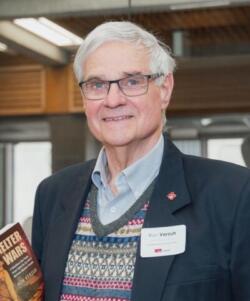Labour disputes and love stories
The Ballad of Ginger Goodwin & Kitimat : Two Plays for Workers
by Elaine Ávila
Vancouver: Talonbooks, 2023
$19.95 / 9781772014471
Reviewed by Ron Verzuh
*

Ginger Goodwin has a special place in my past. I grew up in the Kootenays where he led a strike in 1917 and ran as a socialist in the 1915 provincial election. I also borrowed his name for a short-lived national magazine called Goodwin’s. So I was well backgrounded to appreciate the first of the two plays in Elaine Ávila’s volume. As for Kitimat, not so much.
I had been to the northern BC community of Kitimat and acquainted with people who worked at the Alcan factory there, so had a cursory understanding of the local union movement. But I knew nothing about the Portuguese immigrants that migrated there from the Azores, the ancestral home of the characters in the second play.
Regardless of what I did or didn’t know about either place, I had much to learn and the plays found ways to ease my learning process. Using music was one of those ways. New Westminster’s Ávila (Fado: The Saddest Music in the World) fills her plays with folks songs about working people, immigrants, women, and place. Those inclusions make for a theatrical experience that is richer than a straight history.
She also adds an element that is often missing from some standard historical accounts. Take the Goodwin play. It is set at a moment when Ginger is about to lead the smelter workers into a strike partly for the eight-hour day. It’s a strike story, then, but it’s also a love story.
Ginger falls in love with Anna, an Italian woman, and she bravely supports him as he gets set to confront Mr. Blaylock, the smelter boss. When the strike is lost Goodwin must leave:
Ginger: You know what I’m here to say, don’t you?
Anna: I do.
Ginger: Anna, it’s only a rebel girl like you that made me change my mind and ever think and wish and dream it could be different.
Anna: I’ll wait for you.
Ginger: Anna, I didn’t report for [army] duty. I am a risk for the other men. I cannot pull my weight in a war. I cannot kill another worker.
We learn that Goodwin escapes after an unfair draft decision and hides on Vancouver Island until he is tracked and killed by special police officers, but we don’t expect the tenderness and warmth that grow out of Ávila’s portrayal of the two lovers.
History explains that the strike was ultimately defeated and betrayals surfaced to force its end, including Goodwin’s own international union leadership. What we often miss in the history texts, though, is the real possibility that love drove some of the action and that music served as the inspiration for it. In Ballad, the fight for worker’s rights has long been oiled by song.

There is another element as well. History explains that about half the workforce in Trail was made up of Italian immigrants. The language barrier for a strike organizer was almost impassable. Anna is from Calabria and represents a large proportion of Trail’s population at the end of the First World War. Some accounts of the events being highlighted in the play miss this point. Stressing it, as the play does, adds another human dimension to the action and makes it come alive in a new way.
The Kitimat play employs these same elements, but it centres on both the struggles of immigrants and a plebiscite to decide the building of a pipeline. These facets allow the playwright to introduce a critical environmental side to the story and build tension around it between family members.
The action shifts back and forth between the 1950s immigration of several Azorean families and their settled offspring living in contemporary Kitimat. The offspring recall with pride their heritage as family members take sides. The tension builds when one family member publicly supports the pipeline and another stands up against it. Local First Nations concerns also enter the debate.
An introductory note by Azorean Rosa Maria Neves Simas explains the time shifts: “Kitimat takes us back to the 1950s and the mixture of pain and hope underlying the immigrants’ situation, here depicted by Jose and Clara da Terra.” She adds that “Throughout the play, this earlier time period is intertwined with the lives of the de Terra offspring and their children up to 2014.”
Ávila’s ancestors are Azorean and Kitimat allows her to revisit some Azorean cultural moments through song and remembrances. The notes provide historical evidence of early Azorean travellers. One goes back to the seventeenth century, and is commemorated with a Canada Post stamp. Another describes Azorean visits to Newfoundland cod fisheries.
Like Ginger, Kitimat is a love story. This time it is about family love and difference. In the 1950s time period, Clara and Jose comfort each other as they endure the displacement depression that faces all immigrants:
Jose: Would you tell me a story? Some story of home?
Clara: I do not know what
Jose: Anything.
Clara: You have saudade for home. The great longing.
Jose: For what can never be.
Later, as the plebiscite debate heats up half a century later, sisters Julia and Marta find themselves on opposing sides. As they sort through their parents’ belongings, reminiscing about how hard they had it when they landed in Kitimat, tension mounts:
Marta: It’s an emotional day. Let’s not talk about this now.
Julia: Why did you call for this plebiscite?
Marta (a city councillor): City Council serves the people. We should know what they think.
Julia: Are you giving the oil company a free public-opinion poll?
Julia cheers as the plebiscite results are announced: “It’s one of the most beautiful moments in my life. I’ve completely changed through this. They can’t take away this victory. Ever. I feel like . . . a citizen.”
Both two-act plays reach emotional climaxes as the main events come to a head. Ávila mixes dialogue and song to convey that emotion as she moulds history to culture to politics, giving readers a welcome new perspective on BC community life and perhaps corrects some earlier misconceptions.
*

Ron Verzuh is a writer, historian, and documentary filmmaker. He lived in Yellowknife in 1973 and travelled widely in the far north. Ron lives in Victoria. [Editor’s note: Ron Verzuh has recently reviewed books by Ken McGoogan, Mostafa Henaway, Kennedy Stewart, Henry Tsang, Robert Lower, Benjamin Isitt & Ravi Malhotra, and Marc Edge for The British Columbia Review, and he has contributed an essay on trade unionist Harvey Murphy.]
*
The British Columbia Review
Interim Editors, 2023-25: Trevor Marc Hughes (non-fiction), Brett Josef Grubisic (fiction)
Publisher: Richard Mackie
Formerly The Ormsby Review, The British Columbia Review is an on-line book review and journal service for BC writers and readers. The Advisory Board now consists of Jean Barman, Wade Davis, Robin Fisher, Barry Gough, Hugh Johnston, Kathy Mezei, Patricia Roy, Maria Tippett, and Graeme Wynn. Provincial Government Patron (since September 2018): Creative BC. Honorary Patron: Yosef Wosk. Scholarly Patron: SFU Graduate Liberal Studies. The British Columbia Review was founded in 2016 by Richard Mackie and Alan Twigg.
“Only connect.” – E.M. Forster
3 comments on “Labour disputes and love stories”